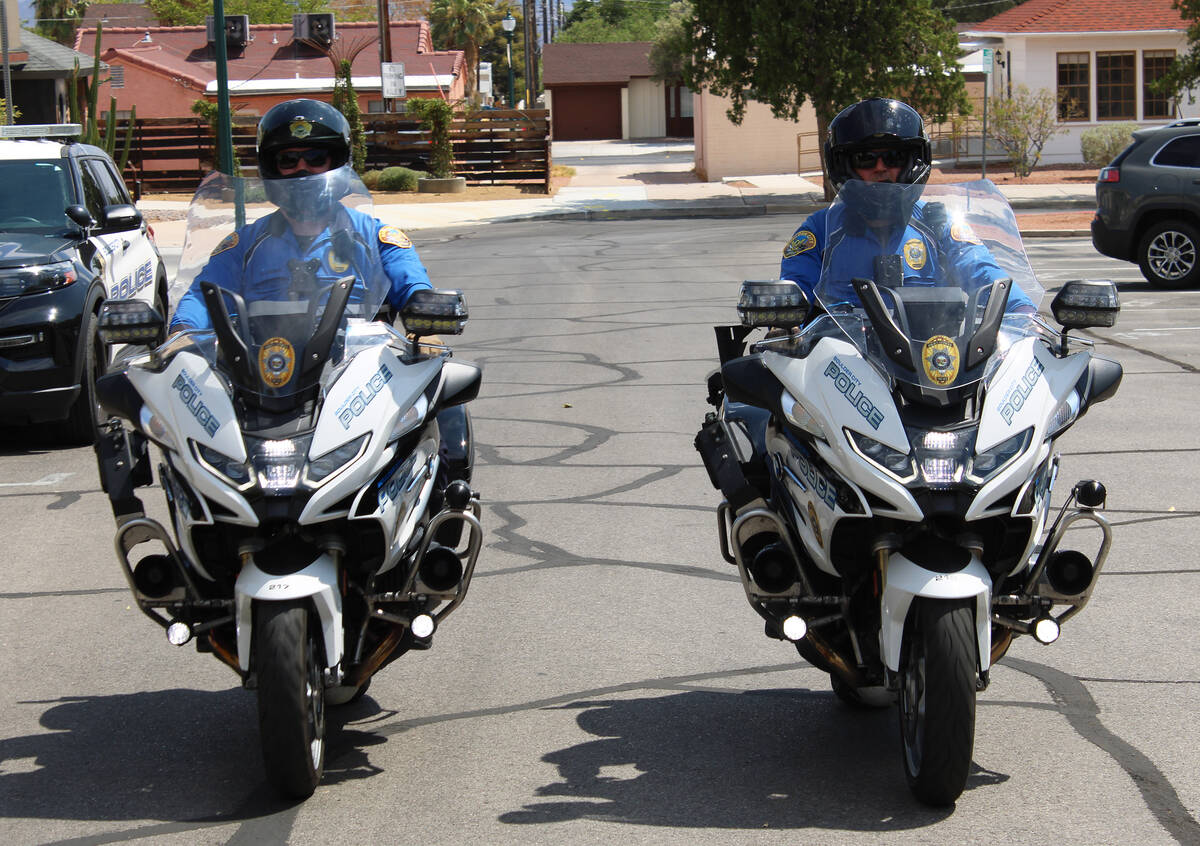Patrolling Boulder City on two wheels
For those of a certain generation, it’s almost impossible to see motorcycle officers, especially when they’re riding in tandem, and not think of the most famous duo of all – Ponch and Jon.
While they may not have the famous theme song playing along as they patrol the streets of Boulder City, BCPD officers Ian Ham and Guy Liedkie prove the need and advantages to having officers on motorcycles.
“For me, the opening was there and I applied,” Liedkie said. “I come from a patrol background with my past agency so it was a smooth transition for me.”
For Ham, who has been with BCPD for 21 years, he’s has found himself as part of the motorcycle patrol twice, with about a decade in total.
“I guess like most Gen-Xers, I grew up a fan of “CHiPS” in the late 70s and early 80s watching Ponch and Jon,” Ham said. “That’s where the fascination for motorcycles began.”
As Ham was quick to point out, doing traffic patrol on a motorcycle is often less difficult than in a patrol car.
“It’s much easier to be inconspicuous,” he said. “It also gives you a better vantage point to look for violations.”
Liedkie agreed and added, “For example, being on a motorcycle, it’s much easier to pull into a private driveway, bicycle lane or center median and not obstruct traffic but still be able to observe traffic. It makes it much easier if you have to turn out and go in the opposite direction. If you’re in a car, it’s hard to find a space to do a U-turn to catch a violator.”
One of the downsides of riding on a motorcycle with long sleeves is the summer heat. But the fact both have been avid motorcycle riders for years, they said it’s just a matter of dealing with it.
“On a good day, it’s miserable,” Liedkie said, laughing. “But you get used to it. If you enjoy riding, you don’t think about it much. For the most part it’s a matter of hydrating and surviving. Riding is a passion, so it’s a bonus that I get to do it at work.”
“You learn really quick to find where the trees are,” Ham added. “I, too, am an avid rider away from work. When my garage is open, it’s full of motorcycles. My wife has one, my 17-year-old daughter has one, four of my own and the city’s motorcycle.”
It’s not uncommon for them to assist with patrols in Henderson or Las Vegas as well as along I-95 and I-11 as part of joint task forces that are often funded by grants. The thing they don’t do is work in tandem here in town, at least not very often since they have opposite schedules. An average daily shift consists of parking enforcement, which Ham jokingly called “A necessary evil,” patrolling I-11 and I-95 as well as in Boulder City.
“We are very proactive rather than reactive when it comes to traffic side,” Ham said. “The majority of my day is spent slowing traffic down and reminding people that we have laws governing speed. That’s what the enforcement side of it is all about. My goal is to keep the number of crashes down.”
When asked what they enjoy most about being motorcycle officers, Ham was quick to answer, “March and October,” because of the cooler weather.
“Even though we are very traffic-focused, it also provides a lot of variety for me,” Liedkie said. “I feel I have become an expert in DUI enforcement, which provides not only a service to the community but to my fellow patrol officers that I work with. I can help them out with DUIs, which frees them up to patrol the neighborhoods. I have advanced training in crashes. So, for me it’s almost like putting Lego pieces together like when you were a kid. But instead, these are 3,000 or 4,000-pound Legos.”
As for Ham, he said, “I just enjoy riding. I feel I get a lot more freedom than what the patrol officers get. They deal a lot more with the day-to-day calls, which I don’t necessarily deal with unless it’s a critical incident call, in which we all respond. I get a lot more freedom in my day to be more proactive, which I really like.”
For now, both feel that Boulder City will not be getting a third motorcycle officer any time soon. As for their need and the advantages for a department in having motorcycle, BCPD Chief Tim Shea said there are many.
“The most noticeable is their maneuverability, which allows them access at times and places where cars cannot travel,” he said. “They are cost-effective, and generally are less expensive to purchase, outfit, maintain and fuel than cars. They have great versatility and can be utilized in various functions and scenarios that exceed where we can utilize cars.
“They have a smaller environmental footprint than a car. Motorcycle officers are more visible and approachable to the public, which can enhance community policing efforts. In short, motorcycles are an effective tool for law enforcement, offering a combination of speed, efficiency and accessibility that can complement the use of patrol vehicles.”
















